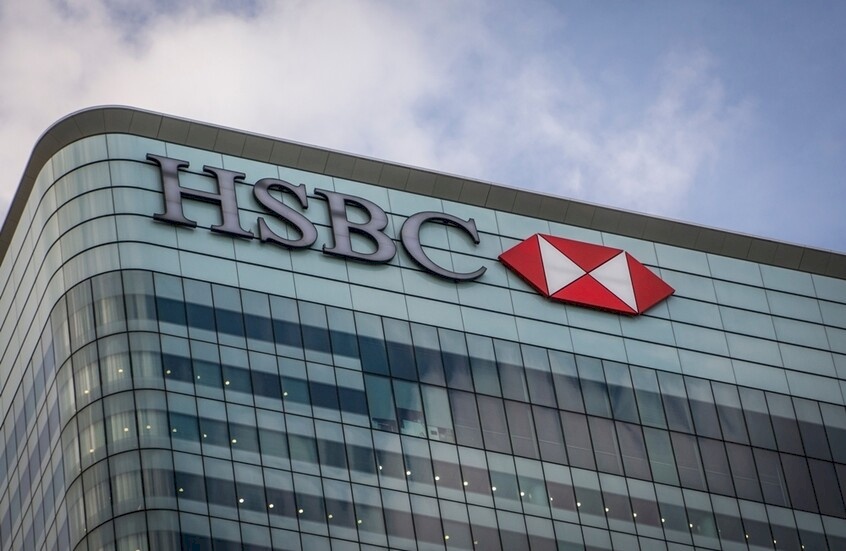
HSBC's Swiss Unit Ends Relations with 1,000 Wealthy Clients from the Middle East
SadaNews - The Swiss private banking unit of HSBC Holdings is terminating its dealings with several wealthy clients from the Middle East, many of whom have assets exceeding $100 million, as the bank seeks to reduce its exposure to individuals classified as high-risk, according to sources familiar with the matter.
According to these individuals, who requested anonymity, more than 1,000 clients from Saudi Arabia, Lebanon, Qatar, and Egypt have been informed that they can no longer continue their business with the bank's Swiss wealth management activities.
They noted that some of these clients have already begun receiving notifications, and they will receive official letters in the coming months outlining the procedures for closing their accounts and recommending the possibility of transferring their funds to other jurisdictions.
In a statement via email, the bank explained that "HSBC" announced last October a plan to restructure the group to accelerate the pace of strategic execution, and "the development of the strategic focus of our private bank in Switzerland is part of this plan."
This move comes at a time when the unit is under continuous scrutiny from the Swiss Financial Market Supervisory Authority (FINMA), which has identified shortcomings in the application of due diligence procedures on high-risk accounts owned by individuals who may be exposed to political risks. Insiders indicated that the process of exiting these accounts is expected to be largely completed within six months, with the bank forming a specialized team to follow up on the closures.
Simplifying the Bank's Organizational Structure
HSBC added: "We are establishing a simpler and more dynamic organization focused on enhancing leadership and increasing market share in areas where we have a clear competitive advantage."
This step represents an additional blow to HSBC in a region that has become a major destination for wealth managers, as competing institutions have intensified efforts to meet the needs of high-net-worth individuals in the Middle East, while the bank has faced challenges despite appointing Aladdin Hungari, the former Chief of Wealth Management at Credit Suisse, a few years ago.
In related news, last year, the Swiss Financial Market Supervisory Authority (FINMA) issued an order preventing HSBC from entering into any new business relationships with what are known as "politically exposed persons", or individuals holding public positions that may make them more susceptible to corruption risks. The authority also required the bank to appoint an external auditor to conduct a comprehensive review of related activities.
The bank classifies clients with fortunes exceeding 100 million Swiss francs ($124 million) as high-risk, taking into account additional factors such as country of residence and nationality.
Challenges in Wealth Management
HSBC's Swiss unit was part of the bank's strategy to expand its wealth management operations in the Middle East. However, it has faced obstacles, including the departure of prominent bankers. Although the bank is usually one of the leading players in the region's capital markets, it has found it difficult to compete with other banks, including Swiss ones, in the private banking sector.
Last month, it was found that the Swiss private unit of HSBC became the focus of a Swiss investigation into allegations of money laundering linked to the alleged embezzlement of hundreds of millions of dollars by the former governor of Lebanon's central bank, Riad Salameh.
In June of last year, the Swiss authority (FINMA) specifically pointed to the existence of two high-risk business relationships, stating that "HSBC Private Bank (Switzerland)" had not adequately verified the source of the assets or their purpose or background. FINMA noted that suspicious financial transactions exceeding $300 million were transferred between Lebanon and Switzerland during the period from 2002 to 2015.
HSBC's private banking unit in Switzerland is part of the bank's global strategy to serve the wealthy, managing assets worth billions of dollars through offices in Europe, Asia, and the Middle East. However, the unit has faced repeated criticisms for failing to combat money laundering, as investigations by FINMA in June 2024 revealed the bank's shortcomings in verifying the sources of funds linked to prominent political figures.
Historically, HSBC has been associated with multiple financial scandals, including a $192 million settlement with U.S. authorities in 2019 for facilitating tax evasion and a record $1.9 billion fine in 2012 for its involvement in money laundering linked to Mexican drug cartels, casting a shadow over the bank's reputation and prompting FINMA to impose strict oversight on its operations in Switzerland.

Barclays: Oil Prices Could Reach $80 per Barrel

Bitcoin Falls Near $63,000 Following Attack on Iran

The Trap of High Prices: Debts Haunt Germans and Bankruptcy Knocks at Their Doors

Major Changes in the Saudi Public Investment Fund… What is Happening?

Gold Stabilizes and Heads for its Seventh Consecutive Monthly Gain

The IMF Disburses Approximately $2.3 Billion to Egypt Following Two Reviews of the "Reform...

Oil Rises Amid Expectations for Nuclear Negotiations Between Washington and Tehran
